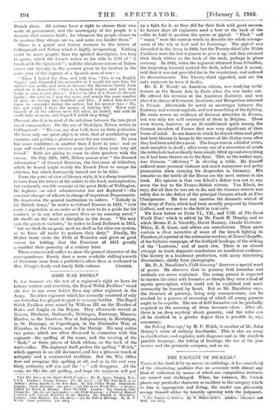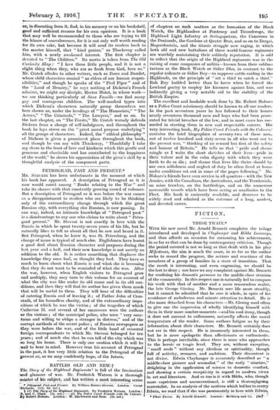THE PAGEANT OF DICKMcS. * Tnoucal this book is by no
means an anthology, it has something of the stimulating qualities that we associate with almost any kind of collection by means of which our competitive instincts arc roused and challenged. When, for instance, Mr. Crotch places any particular character or incident in the category -which to him is appropriate and fitting, the reader can pleasantly occupy himself either by heartily agreeing with the judgment, • Th• pageant of Riekene. By W. Walter Crotch. London: Chapman and Hall. [5s. net.1 or, in dissenting from it, find, in his memory or on his bookshelf, good and sufficient reasons for his own opinions. It is a hook that may well be recommended to those who are trying to fill the leisure of convalescence, for it is not only well worth reading for its own sake, but because it will send its readers back to the master himself, that "kind genius," as Thackeray called him, with a newly awakened interest. The first chapter is devoted to " The Children." Its Motto is taken from The Old Curiosity Shop : " I love these little people, and it is not a slight thing when they, who are so fresh from God, love us." Mr. Crotch alludes to other writers, such as Ibsen and Daudet, whose child characters remind " us elders of our human respon- sibilities," and though he speaks of the " Pied Piper " and of the " Land of Memory," he says nothing of Dickens's French admirer, we might say disciple, Hector Malot, in whose work— we are thinking particularly of Sans Famille—we find many gay and courageous children. The well-marked types into which Dickens's characters naturally group themselves are here shown us, under the headings of " The Humorists," " The Actors," " The Criminals," " The Lawyers," and so on. In the last chapter, on " The Feasts," Mr. Crotch warmly defends Dickens from a charge of self-indulgence, and throughout the book he lays stress on the "great moral purpose underlying" all the groups of characters. Indeed, the " ethical philosophy " of Dickens is given a prominent place throughout the book, and though he can say with Thackeray, " Thankfully I take my share in the feast of love and kindness which this gentle and generous and charitable soul has contributed to the happiness of the world," he shows his appreciation of the giver's skill by a thoughtful analysis of the component parts.



































 Previous page
Previous page